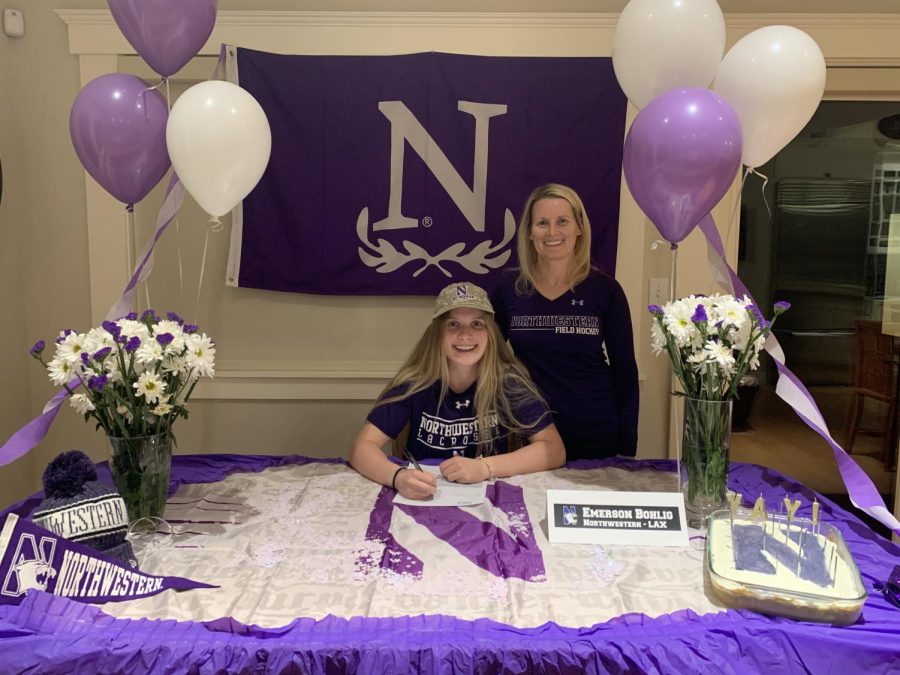Mother-daughter athletic duo reflect on Northwestern and impact of Title IX
Photo courtesy of Tamara Bohlig
Unlike her mother, Emerson Bohlig grew up in California, where lacrosse isn’t as prevalent of a sport.
October 27, 2022
Athletics defined Tamara Bohlig’s Northwestern experience. A varsity field hockey player for four years and varsity lacrosse player for three, Tamara Bohlig (Weinberg ‘91, Kellogg ‘97) spent much of her time in Evanston at practice and games.
Competing for the Wildcats from 1987-1991, Bohlig never could have imagined that her daughter would play lacrosse at NU 30 years later.
“How cool is that?” Bohling said. “That someday my daughter would end up playing for a national championship!”
When Bohlig played field hockey for the Cats, Title IX was in its infancy. At the time, the lacrosse team was largely dependent on the field hockey players of the time since both teams shared coaches.
At the time, Bohlig and her teams didn’t have their own designated place to play. They shared a field with the football team and practiced at odd hours to avoid conflicts. In fact, the women’s lacrosse team wasn’t able to watch football games because when the football team was home, the team was away and vice versa, Bohlig said.
“Who do you think got priority? And I get it,” Bohlig said. “That’s just how it was. It’s not like we complained about it. We didn’t know any different. It wasn’t like, ‘Woe is me.’ We were just so thrilled to be there.”
As she watches her daughter, sophomore midfielder Emerson Bohlig, play for the women’s lacrosse team today, she said she sees the impact of Title IX with the increase in resources and support for the team.
Emerson got her start in lacrosse because of her mother. Tamara, a Pennsylvania native, grew up surrounded by the sport, and Emerson said athletics have always been a significant part of her and her family’s lives.
In eighth grade, Emerson began attending training camps at NU over winter and summer breaks. At the camps, she learned from NU players. Now, it’s her turn to teach aspiring lacrosse players.
“I never expected to play here,” Emerson said. “It’s really cool and weird at the same time. Once it became a reality, it’s hard to believe still.”
When comparing their experiences, Emerson and Tamara Bohlig see the differences Title IX made.
Tamara said she took the lessons she learned from her time as an athlete and applied them to her career. She currently works in northern California as a financial marketing executive, and was invited to speak at the NU “From Athlete to C-Suite” panel this Friday as part of the University’s 50 Years of Title IX programming commemorating Title IX’s 50 Year Anniversary.
“When equity was created, women crushed it,” Tamara said. “Evening the playing field – look what that did for women.”
Although there is still progress to be made, Emerson said she owes much of her athletic career to Title IX. Tamara said her work ethic, career and children all exist because of the legislation.
“I wouldn’t be who I am without Title IX,” Tamara Bohlig said. “I can only imagine the fight to get there. I appreciate and am thankful for all the people who came before me.”
Email: [email protected]
Twitter: @joanne_n_h
Related Stories:
— Q&A: Former Northwestern tennis player, USTA chair Katrina Adams talks Title IX and NU athletics
— Top Northwestern women athletes who have gone professional
— Fifty years since Title IX, Northwestern women alumni shine in the sports media world


